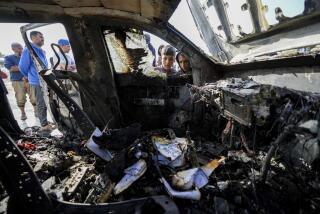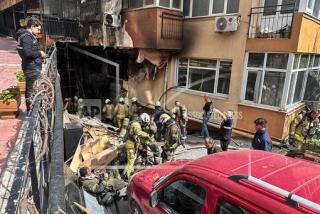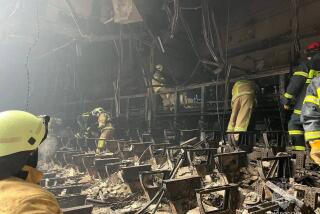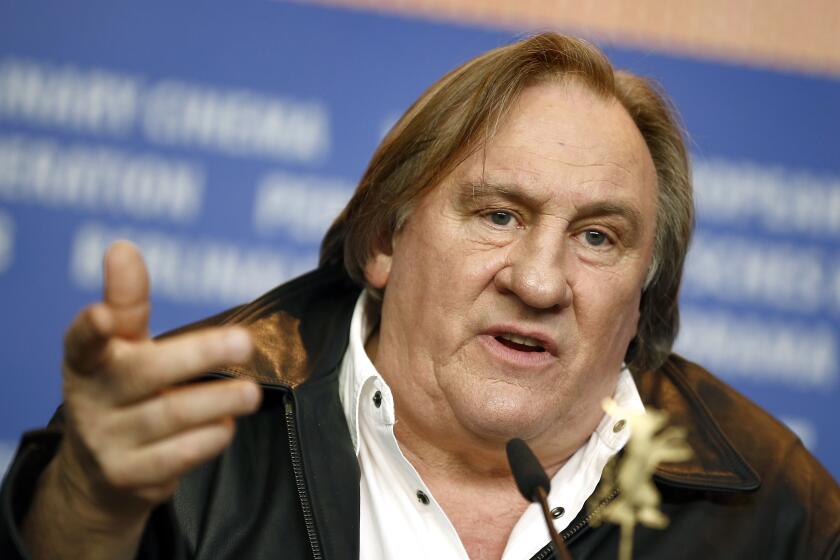Islamic State claims it carried out Tunisia museum attack; 9 arrested

The Islamic State group has issued a statement claiming responsibility for a deadly attack on one of Tunisia’s main museums.
The extremist group Islamic State claimed responsibility Thursday for an attack on a major museum in Tunisia’s capital that killed 23 people and injured dozens of others, including many foreign tourists.
Tunisian officials did not confirm the group’s role but said they had identified two gunmen killed in a firefight with police and arrested nine other suspects in connection with Wednesday’s attack.
The bloody rampage at the National Bardo Museum dealt a blow to Tunisia’s tourism industry, a critical source of jobs and revenue in a country widely seen as North Africa’s best hope for a functioning democracy. Two Mediterranean cruise lines, Costa Crociere and MSC Cruises, announced they were canceling all upcoming stops in Tunisia after 17 of their passengers were killed in the attack.
In all, at least 20 foreigners died along with three Tunisian nationals, Health Minister Said Aidi said. They include visitors from Australia, Belgium, Britain, Colombia, France, Japan, Poland and Spain. Nearly 50 people were injured, some of them critically.
Among the dead were a couple from Barcelona who were celebrating their 50th wedding anniversary, Spanish Foreign Minister Jose Manuel Garcia-Margallo told reporters. It was the first time the couple had traveled abroad.
Another Spanish couple, including a pregnant woman, spent the night hiding in the basement of the museum, too afraid to come out, Tunisian officials said. They were discovered in the morning, along with a museum employee who had taken refuge in a store room. All were unharmed.
Hundreds of Tunisians stopped by the museum, famed for its collection of Roman mosaics, to pay their respects to the victims and rally behind the country’s fledgling democracy. At the entrance to the compound, a woman stood amid shards of glass and traces of blood, wrapped in the Tunisian flag and holding a bouquet of white roses.
“Tunisia is free,” she chanted with the swelling crowd. “Terrorism will be kicked out.”
An audio recording and written statement distributed on social media accounts associated with Islamic State said that two of its fighters, armed with machine guns and grenades, carried out the attack on a “den of infidelity and vice.”
“The blessed operation led to the killing of scores of infidels and apostates, and the failing security forces did not dare to even approach until after the two heroes ran out of ammunition,” the statement said.
It described the attack as “the first drop of rain” and said more would follow.
Prime Minister Habib Essid said the Tunisian security services were working with other countries to determine the affiliations of the gunmen, identified as Yassine Abidi and Hatem Khashnaoui. In an interview with the French radio network RTL, Essid said Abidi had been on authorities’ radar before the attack, but not for “anything special.”
Security officials said Abidi went missing several months ago. He last contacted his family using an Iraqi phone number, they said. Khashnaoui may have been associated with militants operating in the mountains along Tunisia’s western border with Algeria, according to officials familiar with the investigation.
Among those taken into custody were four people believed to be directly involved in Wednesday’s attack, the president’s office said. The five others were thought to have provided support to the assailants from outside the capital, Tunis.
Tunisia is the country where the string of uprisings that became known as the “Arab Spring” began in 2011 and the only one to have managed a relatively stable transition to democracy, after the overthrow of longtime strongman Zine el Abidine ben Ali.
However, the security forces have struggled to contain Islamist extremists, and there are frequent clashes in the country’s interior and border regions. Some of these groups were previously affiliated with Al Qaeda’s North African franchise but have started claiming association with Islamic State.
As many as 3,000 Tunisian nationals may have joined Islamic State and other groups fighting in Syria and Iraq, according to government estimates. The militant group is also active in neighboring Libya, where many Tunisians have gone to train and fight. At least 500 Tunisians are believed to have returned recently from Syria, the government has said.
Special correspondents Addala reported from Tunis, Hassan from Berlin and Times staff writer Zavis from Los Angeles. Staff writer Efrain Hernandez Jr. in Los Angeles contributed to this report.
More to Read
Start your day right
Sign up for Essential California for news, features and recommendations from the L.A. Times and beyond in your inbox six days a week.
You may occasionally receive promotional content from the Los Angeles Times.







